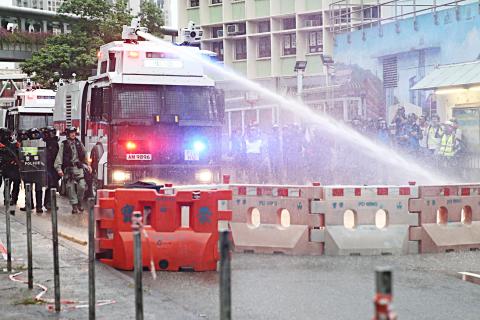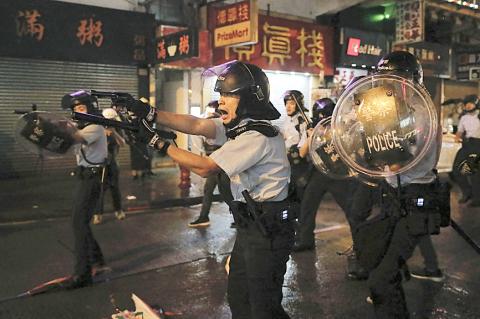Police in Hong Kong yesterday used tear gas to clear pro-democracy demonstrators who had taken over a street and brought out water cannon trucks for the first time in the summer-long protests.
The skirmish on a main drag in the Tsuen Wan district in the New Territories followed a march that ended in a nearby park.
While a large crowd rallied in the park, a group of protesters took over a main street, strewing bamboo poles on the pavement and lining up orange and white traffic barriers and cones to obstruct police.

Photo: EPA-EFE
After hoisting warning flags, police used tear gas to try to disperse the crowd. Protesters responded by throwing bricks and gasoline bombs toward the police.
The result was a surreal scene of small fires and scattered paving bricks on the street between the two sides, before the protesters abandoned their position.
Two water cannon trucks and a phalanx of police vehicles with flashing lights joined riot police on foot as they advanced up the street. They met little resistance.

Photo: AP
Television footage showed a water cannon being fired once, but perhaps more as a test, as it did not appear to reach the protesters.
Later in the evening, a Hong Kong police officer fired at least one gunshot in Tsuen Wan, the first time a live round has been used during three months of protests.
“According to my understanding, just now a gunshot was fired by a colleague... My initial understanding was that it was a uniformed policeman who fired his gun,” a Hong Kong police officer said.
Prior to the skirmishes, tens of thousands of umbrella-carrying protesters marched in the rain.
Many filled Tsuen Wan Park, the endpoint of the rally, chanting, “Fight for freedom, stand with Hong Kong,” the South China Morning Post reported.
The march in the New Territories started near the Kwai Fong train station, which has become a focal point for protesters after police used tear gas there earlier this month. Police with riot gear could be seen moving into position along the march route.
Police yesterday said they arrested 29 people on Saturday for various offenses, including unlawful assembly, possession of offensive weapons and assaulting police officers, after a large group of protesters clashed with police after a march in the Kowloon Bay neighborhood, building barricades and setting fires in the streets.
Ten people were left in hospital after Saturday’s clashes — two in a serious condition — staff said, without detailing if they were police or protesters.
Meanwhile, the territory’s metro system, the MTR, is the latest business to face public censure, after appearing to bend to Chinese state-media attacks accusing the system of being an “exclusive” service to ferry protesters to rallies.
The MTR yesterday shut stations near the main demonstration area in Tsuen Wan, in the second day of station closures in a row.
A second rally of a few hundred, some of them family members of police, yesterday criticized the government for leaving officers to handle the brunt of the crisis, while also calling for an independent investigation into the police handling of the protests.
“I believe within these two months, police have got enough opprobrium,” said a woman who asked not to be named and said she was a police officer’s wife.
“I really want you to know even if the whole world spits on you, we as family members will not. Remember, your job is to serve Hong Kong residents, not be the enemies of Hong Kong,” she said.
Additional reporting by AFP

MAKING WAVES: China’s maritime militia could become a nontraditional threat in war, clogging up shipping lanes to prevent US or Japanese intervention, a report said About 1,900 Chinese ships flying flags of convenience and fishing vessels that participated in China’s military exercises around Taiwan last month and in January last year have been listed for monitoring, Coast Guard Administration (CGA) Deputy Director-General Hsieh Ching-chin (謝慶欽) said yesterday. Following amendments to the Commercial Port Act (商港法) and the Law of Ships (船舶法) last month, the CGA can designate possible berthing areas or deny ports of call for vessels suspected of loitering around areas where undersea cables can be accessed, Oceans Affairs Council Minister Kuan Bi-ling (管碧玲) said. The list of suspected ships, originally 300, had risen to about

DAREDEVIL: Honnold said it had always been a dream of his to climb Taipei 101, while a Netflix producer said the skyscraper was ‘a real icon of this country’ US climber Alex Honnold yesterday took on Taiwan’s tallest building, becoming the first person to scale Taipei 101 without a rope, harness or safety net. Hundreds of spectators gathered at the base of the 101-story skyscraper to watch Honnold, 40, embark on his daredevil feat, which was also broadcast live on Netflix. Dressed in a red T-shirt and yellow custom-made climbing shoes, Honnold swiftly moved up the southeast face of the glass and steel building. At one point, he stepped onto a platform midway up to wave down at fans and onlookers who were taking photos. People watching from inside

Japan’s strategic alliance with the US would collapse if Tokyo were to turn away from a conflict in Taiwan, Japanese Prime Minister Sanae Takaichi said yesterday, but distanced herself from previous comments that suggested a possible military response in such an event. Takaichi expressed her latest views on a nationally broadcast TV program late on Monday, where an opposition party leader criticized her for igniting tensions with China with the earlier remarks. Ties between Japan and China have sunk to the worst level in years after Takaichi said in November that a hypothetical Chinese attack on Taiwan could bring about a Japanese

The WHO ignored early COVID-19 warnings from Taiwan, US Deputy Secretary of Health and Human Services Jim O’Neill said on Friday, as part of justification for Washington withdrawing from the global health body. US Secretary of State Marco Rubio on Thursday said that the US was pulling out of the UN agency, as it failed to fulfill its responsibilities during the COVID-19 pandemic. The WHO “ignored early COVID warnings from Taiwan in 2019 by pretending Taiwan did not exist, O’Neill wrote on X on Friday, Taiwan time. “It ignored rigorous science and promoted lockdowns.” The US will “continue international coordination on infectious